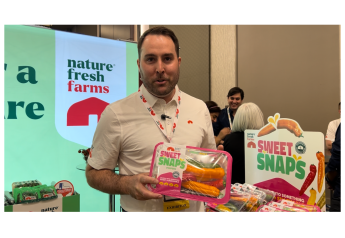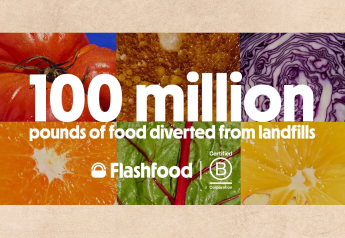Labor crisis could open the door for Congress to act on immigration reform

The universal labor crisis in the U.S. could open the door to immigration reform, Alex DiNovo believes.
That was one takeaway during a United Fresh Produce Association Reimagine Conversations virtual event on June 29 that focused on planning for uncertainty and reacting to unexpected changes.
The session was moderated by Danny Dumas, president of USA for Montreal-based Courchesne Larose Lte.
Panelists included Mayda Sotomayor-Kirk, CEO of Seald Sweet LLC, Vero Beach, Fla.; and DiNovo, president and chief operating officer of DNO Inc., Columbus, Ohio.
“I’m really hoping this (tight) labor situation is going to be the vehicle that opens up immigration reform,” DiNovo said during the session, noting that employers in many sectors are having difficulty finding workers. “It is going to break eventually and (Congress) is going to do something with it, and they will pick it up a lot sooner rather than later.”
DiNovo said there is ample justification for immigration reform that would increase the supply of workers.
“Why wouldn’t you loosen the strings up there on immigration and make it easier to get a labor force into this country? Clearly what’s happening right now is not working,” he said.
Finding focus
Dumas asked the panel about what the industry should focus on during what seems to be a “never-ending” pandemic.
Panelists discussed a variety of issues, including infrastructure, inflation, labor, climate change and political changes in exporting countries.
Fresh produce has always been dynamic and ever-changing, but Sotomayor-Kirk said she thinks changes in weather are more extreme now.
“This year, more than any other year, I’ve seen so much climate change,” she said. “Climate change has really changed not only the quality of the fruit and the timing of the fruit — there’s no predicting anymore.”
Other factors that the industry must remain focused on, she said, include labor, food safety and rising input costs.
“We want to grow consumption, but we have to do it with a cost-effective product,” she said.
DiNovo said the focus should not be on the problems the industry faces, but who the industry will use to solve those problems.
“From my perspective, it’s attracting and retaining the best people that I can get in my company, because I know no matter what the problem is, I need to have really good people in place,” he said. “And it is not just my company — for us as an industry, how do we attract the best talent?”
Dumas agreed that the next generation of leaders is critical for the industry.
“There is a lot of up-and-coming talent that’s in our industry,” he said. “It’s important to have the generation following up, ready to take on these roles in their own way. “
COVID-19 changes
DiNovo said COVID-19 disrupted everything and required “hustle and adaptation” to change something bad into something good.
“It was more of a change in terms of our thought processes and how we approach an issue,” he said. “We don’t see it as an issue, we see it as an opportunity.”
Despite the use of video meetings since March of last year, Sotomayor-Kirk said the pandemic didn’t diminish the importance of face-to-face interactions.
“I think that part of what makes us unique in this produce business is the fact that the people are so just salt of the earth,” she said. “When you really want to talk to someone and look in somebody’s eyes, negotiate a deal, or talk about a problem, it’s much better in person.”
Dumas said operating with agility has been a big lesson during the pandemic.
“It was supposed to be two weeks to stop the spread, here we are a year and a half later,” he said. “I think the successful companies have that agility and the ability to change the mindset and the way they operate or the way they serve their customers really made a difference.”
Labor trouble
Dumas asked the panel what tactics and strategies are needed to manage the labor shortages, knowing the issue can’t be resolved in the short term.
Sotomayor-Kirk said labor challenges are present not only in the U.S., but also in exporting countries such as Chile, Argentina and Peru.
Incentive programs that raise wages and lead to better productivity are being explored, she said.
Longer term, she said the company will look to automate, when possible, in an effort to keep costs lower.
DiNovo said produce companies need to offer competitive wage benefits and flexibility but also create a sense of mission.
“We try to do a good job of focusing on the purpose, the mission,” he said.
Focusing on the greater good and purpose behind produce is important, but having a competitive wage package also is required.
Truck driver positions are the hardest to fill, followed by warehouse and production line jobs, he said.
Dumas said one tactic some companies use to retain workers is to pay them daily.
“Since implementing some of those incentives, we’ve actually seen an increase in productivity,” he said.
Sotomayor-Kirk expressed concern that rising costs of labor and other inputs could hurt consumer demand for fresh produce, although she noted that other foods have experienced inflation as well.
Infrastructure needs
Dumas asked about the infrastructure needs of the industry.
People are the biggest factor in getting the job done, Sotomayor-Kirk said.
“It is based on getting the right people on board; infrastructure, for us, still revolves around trying to automate and train and give people (the) ability to do better.”
DiNovo said it is important for industry operators to lobby with United Fresh Produce Association and others for the infrastructure needs of the industry, including roads, cold storage facilities and other needs.
“I feel like as an industry, we should get involved to ring that bell a little bit,” he said.
Future progress
Looking to the future, DiNovo predicted more distribution facilities, so freight into each region can be “right-sized.”
“I think that’ll be huge into the future, in really smoothing out the supply chain,” he said.
Changing political leadership in a variety of Latin American countries is something to watch, Sotomayor-Kirk said, noting difficult elections in Chile and Peru and other disruptions in Honduras and Mexico.
“All of these dynamics really play into where we what’s going to happen in the future,” she said.
Any government change that isn’t friendly to exporters could quickly disrupt the North American year-round produce supply, she said.
Dumas said diversification is a wise move, considering so many uncertainties in politics and climate.
“We want to make sure that we’re totally diversified, not relying on one area for what we’re producing or sourcing,” he said.
Inflation worries
DiNovo said that the recent uptick in inflation is likely transitory.
“I think that as a country, I believe that we’re on top of it,” he said, noting the expected inflationary whiplash pressure from not having any demand for a period of time.
With a backdrop of rising prices, Dumas said it will be important that consumers still see value in fresh produce .
Sotomayor-Kirk said it is important that inflation not move into double digits as some Latin American countries have seen over the years.
“We could stay within this level, but we could be a hop and skip away from being a country with 19% inflation, and that’s a concern.”







